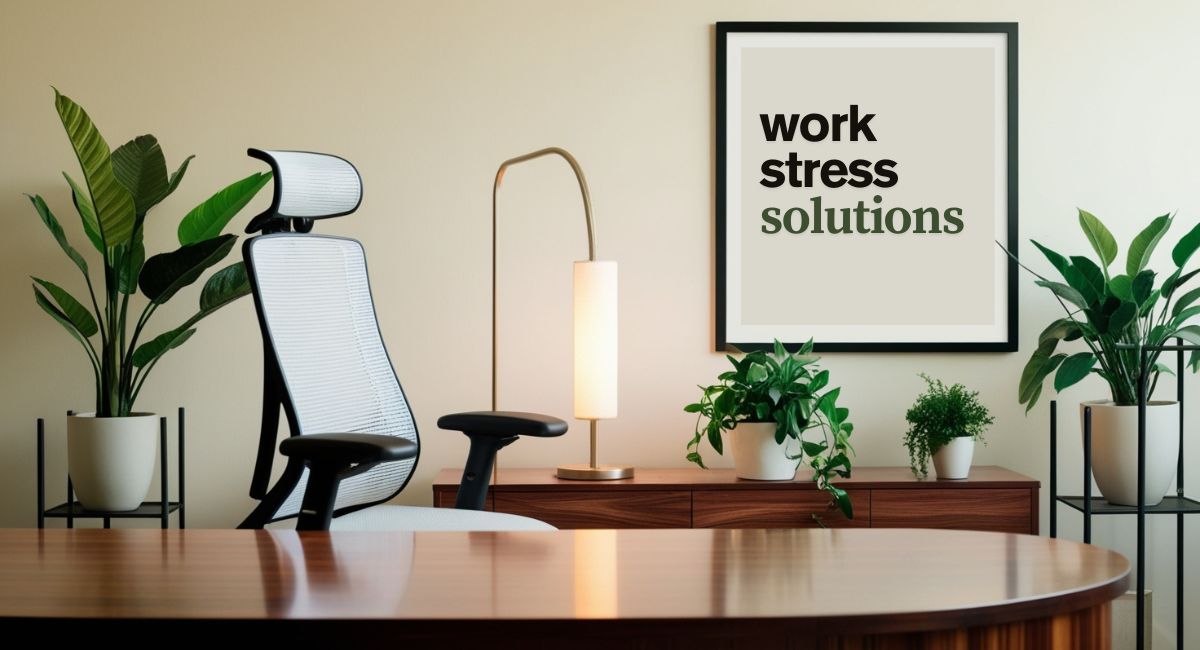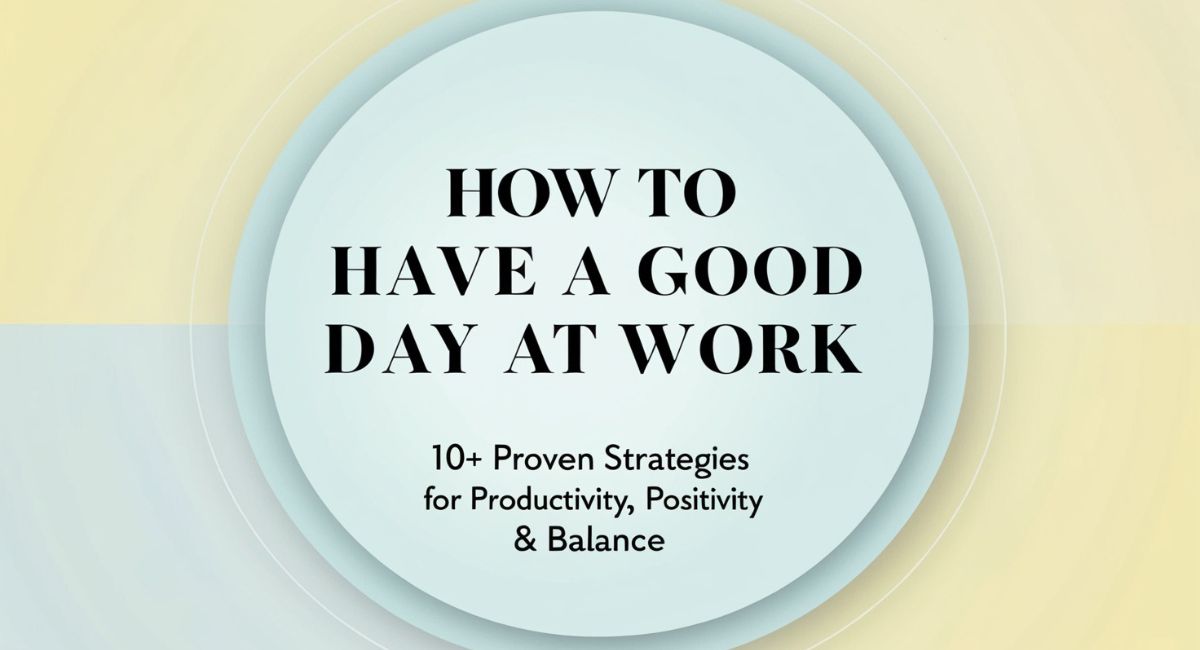Having a successful and fulfilling workday isn’t just about showing up; it’s about being intentional from start to finish. Knowing how to have a good day at work starts with setting the right tone in the morning and maintaining focus throughout your schedule.
Whether you’re in a fast-paced office or working remotely, building a routine that supports both workplace productivity and emotional well-being can change everything. From managing workplace stress to developing healthy habits, each small choice matters. When you create a daily rhythm that supports your energy and mindset, you’re not just surviving the day; you’re thriving in it.
1. Start with a Powerful Morning Routine
Every great workday starts before the actual work begins. To create a pre-work routine that works, wake up early and give yourself time to prepare. Instead of jumping into emails or scrolling your phone, start slow. Try stretching, drinking water, or writing in a journal. This helps your mind get ready for the day.
A strong morning routine boosts your energy, helps build a positive mindset, and sets you up for success. According to a Harvard study, people who start their mornings calmly are more focused and less likely to experience workplace stress. Begin by setting your clothes out the night before, preparing your lunch, or reviewing your daily goals.
Wake Up with Intention
- Start your morning routine early to create space for professional growth and peace.
- Set clear daily goals before leaving bed to guide your productive workday.
- A positive start helps build a positive mindset and better workplace productivity.
- Avoid the snooze button to stay energized and maintain healthy habits.
- Intentional mornings help reduce workplace stress and support emotional well-being.
Practice Gratitude and Mindfulness
- Practicing mindfulness helps you handle bad workdays with calm and clarity.
- A daily gratitude habit boosts your mental health at work naturally.
- Mindful breathing can help you cope with a stressful job effectively.
- Gratitude journaling improves your focus and increases workday productivity.
- Staying present in the moment can fix a bad day at work before it gets worse.
Fuel Up with a Healthy Breakfast
- A balanced breakfast boosts physical and mental wellness for a better start.
- Nutritious food fuels you to stay focused and energized all morning.
- Eating well helps reduce brain fog and supports time management.
- A healthy meal lowers the chance of burnout and aids employee wellness.
- Skipping breakfast may leave you feeling unproductive at work by mid-morning.
2. How to Have a Good Day Like a Pro
Without a plan, your day can feel chaotic. That’s why daily planning strategies are so important. Before your work starts, list what needs to get done. Use tools like Google Calendar or a paper planner to write down your tasks. Make time for breaks and include any meetings or deadlines.
Experts recommend time-blocking for tasks. This method means assigning each task a set time. It helps you stay focused and avoid rushing at the end of the day. If you’re feeling unproductive at work, this planning method brings structure and purpose to your routine.
Set Clear Daily Goals
- Writing daily goals helps you prioritize tasks and avoid time waste.
- Clear targets support a more productive workday from start to finish.
- Daily planning improves your time-blocking for tasks and focus.
- A goal-driven day helps you improve your workday and reduce chaos.
- Knowing your top goals boosts workplace productivity and motivation.
Use Tools like the Eisenhower Matrix
- The Eisenhower Matrix makes it easier to prioritize tasks smartly.
- It separates urgent from important, helping you with daily planning strategies.
- Smart tools like this reduce digital distractions and overload.
- Organizing tasks boosts workday productivity, tips, and reduces stress.
- Using decision tools improves time management and mental clarity.
Schedule Breaks and Downtime
- Taking short breaks improves focus and emotional well-being.
- Regular break time at work prevents burnout and boosts energy.
- Downtime helps your mind reset and stay focused and energized.
- Breaks reduce workplace stress and increase overall output.
- Smart scheduling helps you avoid feeling unproductive at work.
3. Tackle High-Priority Tasks First
Not all tasks are created equal. Always prioritize tasks that matter most. Doing the important jobs first makes you feel accomplished and reduces stress. If you wait, they pile up and make you anxious.
Try the “Eat That Frog” method. Start your day with the biggest or hardest task. It clears your mind and gives you confidence. This is one of the best workday productivity tips that can instantly improve your workday.
Beat Procrastination Early
- Start strong to avoid feeling unproductive at work later in the day.
- Beating procrastination helps you prioritize tasks more effectively.
- Early focus boosts your workplace productivity and confidence.
- Tackling tasks early reduces workplace stress and last-minute pressure.
- Breaking delay habits is key to a more productive workday.
Create Momentum with Morning Wins
- Completing small tasks early creates a positive mindset and rhythm.
- Morning wins improve your emotional well-being and drive.
- Early progress increases mental health at work and energy levels.
- Momentum in the morning helps you stay focused and energized.
- Quick wins build confidence and reduce the stress of a stressful job.
4. Optimize Your Work Environment

Your surroundings affect your energy. A cluttered desk can make your thoughts feel messy, too. To feel better, you must organize your workspace. Keep only what you need on your desk. Store the rest away. Add small plants or photos that bring you joy.
If you’re working from home, set clear boundaries between work and personal space. A good office environment helps you stay productive and reduces mental health issues at work. Clean spaces lead to clear thinking and fewer distractions.
Declutter & Organize Your Workspace
- A clean desk boosts workplace productivity and lowers workplace stress.
- Organize your workspace daily to reduce digital distractions and mental clutter.
- Good desk organization supports better focus and faster task handling.
- A tidy space improves your emotional well-being at work.
- Decluttering helps reduce feelings of being unproductive at work.
Add Personal Touches for Motivation
- Photos or quotes inspire a more positive mindset throughout the day.
- Personal items create a cozy office environment and boost morale.
- A personalized desk setup improves mental health at work.
- Surrounding yourself with positive people and memories lifts energy.
- Motivational touches help stay focused and energized all day.
Ensure Ergonomic Comfort
- A good chair and desk setup supports physical and mental wellness.
- Proper posture prevents fatigue and improves workplace productivity.
- Healthy habits like sitting correctly reduce long-term pain.
- Comfort at work helps you cope with a stressful job better.
- Ergonomic tools make a big difference in employee wellness.
5. Strengthen Positive Workplace Relationships
Who you work with matters. Surrounding yourself with positive people can boost mood, teamwork, and confidence. Good relationships at work are key to employee wellness and success.
Avoid toxic coworkers who drain your energy. Instead, spend time with those who inspire you. Talk, listen, and offer support. A simple thank-you or kind word can change someone’s day. Workplace relationships are one of the most powerful ways to feel better at work.
Greet Coworkers and Share Smiles
- A warm greeting can build strong workplace relationships and boost morale.
- Sharing smiles encourages a positive mindset and a friendly atmosphere.
- Small acts of kindness help improve your emotional well-being at work.
- Starting the day with a connection improves your workday productivity.
- Positive greetings help you surround yourself with positive people.
Engage in Healthy Communication
- Clear talk reduces workplace stress and prevents misunderstandings.
- Listening actively improves employee wellness and teamwork.
- Healthy chats support professional growth and trust.
- Speaking with care helps you cope with a stressful job.
- Effective communication boosts your daily goals and focus.
Practice Empathy and Respect
- Respecting others builds strong workplace relationships.
- Empathy supports mental health at work and team unity.
- A kind attitude helps fix a bad day at work for others.
- Being thoughtful reduces conflict and workplace stress.
- Showing empathy creates a better office environment for all.
6. Stay Energized Throughout the Day
Energy isn’t just about coffee. What you eat, how you move, and when you take breaks also matter. Eating a healthy lunch and drinking water can keep you alert. Take short walks or stretch every hour. Your body and brain need movement to stay sharp.
Schedule a proper break time at work. Step away from your desk, even for 5 minutes. Avoid scrolling your phone. Instead, look outside, breathe deeply, or walk around. These habits help you stay focused and energized throughout the day.
Take Microbreaks or Use the Pomodoro Technique
- Using the Pomodoro Technique improves time management and sharpens focus.
- Break time at work helps refresh your mind and prevents burnout recovery needs.
- Short pauses boost workplace productivity by resetting your mental energy.
- Microbreaks are great work stress solutions that reduce fatigue.
- Structured breaks help you stay focused and energized all day.
Stay Hydrated and Eat Smart Snacks
- Drinking water and smart snacks support employee wellness and brain function.
- Healthy habits like hydration reduce feelings of unproductive at work.
- Nutritious snacks enhance mental health at work and improve concentration.
- Staying hydrated helps you maintain physical and mental wellness.
- Smart eating keeps workplace stress low and energy levels high.
Stretch, Walk, or Do Mindfulness Exercises
- Gentle stretches boost circulation and improve emotional well-being.
- Short walks clear your mind and help you deal with distractions at work.
- Practicing mindfulness is a powerful way to reduce workplace stress.
- Movement supports healthy habits and helps you feel better at work.
- Physical activity during the day enhances your productive workday rhythm.
7. Master Digital Tools for Better Focus
In the digital world, distractions are everywhere. Emails, messages, and apps can ruin your focus. The best way to deal with distractions at work is to take control of your devices. Silence non-urgent notifications and only check email at set times.
Use productivity tools wisely. Apps like Todoist, Focus Booster, or Forest can help you track your time and stay on task. When you turn off notifications, your mind stays clear. These tools support time management and protect your professional growth.
Use Apps to Stay Organized
- Productivity apps help you organize your workspace and track daily goals.
- Digital planners boost workplace productivity through better daily planning strategies.
- Task apps support time-blocking for tasks and reduce mental clutter.
- Staying digitally organized enhances your professional growth and focus.
- Apps for to-do lists minimize the feeling unproductive at work and missing deadlines.
Automate Repetitive Tasks
- Automation frees time so you can prioritize tasks that matter most.
- Tools like email filters and templates support workday productivity tips.
- Automating tasks reduces workplace stress and manual errors.
- Smart workflows improve time management and team efficiency.
- Removing repetition lets you focus on employee wellness and creativity.
Mute Distractions and Turn Off Notifications
- Turning off alerts helps in dealing with distractions at work effectively.
- Silencing apps allows you to stay focused and energized.
- Fewer pings lead to better mental health at work and deep work.
- Digital distractions can ruin your productive workday if left unchecked.
- Control your tech to improve emotional well-being and calm.
8. Manage Workplace Stress Effectively

Stress at work is normal. But if it’s constant, it becomes a problem. The key is learning work stress solutions that calm your mind and body. Deep breathing, walking, or talking to someone can help. Even five minutes of silence can reduce tension.
Your emotional well-being should be a priority. If your job is causing too much stress, speak with HR or a counselor. Burnout hurts your health and productivity. Practicing physical and mental wellness techniques is important for long-term success.
Recognize Signs of Burnout
- Watch for feeling unproductive at work, exhaustion, or loss of motivation.
- Early detection of burnout helps you apply work stress solutions fast.
- Ignoring symptoms can affect your emotional well-being and performance.
- Understanding burnout is key to coping with a stressful job.
- Recognizing these signs allows for timely burnout recovery and rest.
Try Breathing & Relaxation Techniques
- Simple breathing exercises reduce workplace stress and increase focus.
- Relaxation habits improve mental health at work and reduce tension.
- Deep breathing helps you stay focused and energized under pressure.
- Mindful pauses during the day support physical and mental wellness.
- Practicing calm techniques is one of the best ways to feel better at work.
Know When to Take a Mental Health Day
- A break helps you fix a bad day at work and recharge.
- Mental health days support employee wellness and long-term performance.
- Time off can help recover from toxic coworkers and stress.
- Knowing your limits is part of building a strong work-life balance.
- Taking a day off can prevent full-blown burnout and recovery needs.
9. End Your Day with Reflection and Prep
The end of the workday is just as important as the beginning. Take 10 minutes to review what went well. Write down wins and things to improve. Doing this builds awareness and helps with end-of-day planning.
Then, prepare for tomorrow. Clear your desk, update your task list, and shut down your computer. A clean space signals to your brain it’s time to rest. These steps help reduce anxiety and boost workplace productivity the next day.
Review Your Daily Wins & Challenges
- Reflecting helps improve your workday by understanding what worked well.
- Acknowledging small victories boosts your positive mindset and confidence.
- Daily reflection supports long-term professional growth and focus.
- Recognizing setbacks helps prevent feeling unproductive at work tomorrow.
- Tracking progress keeps your workday productivity tips aligned with goals.
Prepare for Tomorrow’s Top Tasks
- Planning ahead supports effective time-blocking for tasks.
- Clear preparation reduces workplace stress in the morning.
- Night-before planning is a smart daily planning strategy.
- Outlining tomorrow’s goals helps you prioritize tasks with ease.
- Ending the day with focus boosts end-of-day planning success.
Disconnect from Work After Hours
- Logging off supports a healthier work-life balance long term.
- Evening downtime improves your emotional well-being and sleep.
- Creating boundaries helps with coping with a stressful job.
- After-work rest reduces burnout recovery risks.
- Detaching from screens prevents digital distractions from spilling into home life.
10. Build a Healthy Work-Life Balance
Work is important, but so is rest. If you never disconnect, your energy fades. A strong work-life balance protects your health and relationships. After work, turn off emails and spend time doing what you love.
Balance looks different for everyone. For some, it means dinner with family. For others, it’s reading or going for a run. The point is to recharge so you’re ready for tomorrow. When you set clear limits, you avoid burnout, recovery situations, and enjoy your life more.
Set Boundaries Around Your Work Hours
- Clear work limits support better work-life balance and reduce burnout.
- Defining office hours helps in coping with a stressful job.
- Boundaries protect your emotional well-being from constant pressure.
- Respecting time off boosts your mental health at work.
- Sticking to set hours helps fix a bad day at work quickly.
Engage in Hobbies and After-Work Activities
- Hobbies recharge your mind and support physical and mental wellness.
- Creative activities help you feel better at work the next day.
- Fun after-work routines improve employee wellness and satisfaction.
- Making time for interests enhances your positive mindset.
- Evening hobbies are great ways to feel better at work.
Maintain a Life Beyond the Office
- A rich personal life strengthens your emotional well-being.
- Social time outside work combats workplace stress.
- Life balance encourages long-term professional growth.
- Staying connected with loved ones supports healthy habits.
- Having fun beyond work makes bad workdays easier to handle.
Bonus: How to Recover from a Bad Day at Work
Some days just don’t go well. Maybe you missed a deadline or had a conflict. If you’re facing bad workdays, the first step is to breathe. Accept that bad days happen and that you can start fresh tomorrow.
To fix a bad day at work, do something kind for yourself. Take a warm shower, go for a walk, or write your feelings down. Talk to a friend or loved one. Use the evening to relax. This helps with coping with a stressful job and prepares you for a better tomorrow.
Don’t Be Too Hard on Yourself
When you make a mistake during a bad workday, remind yourself that even top performers have setbacks; it’s part of professional growth.
Focus on What Can Be Fixed
If your meeting didn’t go well, review your notes and practice your pitch again. Small actions can fix a bad day at work and boost workplace productivity.
Learn and Let Go
After missing a deadline, note what went wrong, apply a better time-blocking method for tasks, and move forward with a stronger positive mindset.
Final Thoughts
Now you know how to have a good day at work, even when it seems tough. By building strong habits, managing stress, and improving your environment, you take control of your time and your energy. These tips don’t just make you more productive, they make you happier.
Whether it’s using time-blocking for tasks, enjoying break time at work, or improving your desk organization, each step helps you move forward. Start small and stay consistent. Your best workdays are ahead of you.
Frequently Asked Questions
1. How do you have a good day at work?
Start with a solid morning routine, set clear daily goals, and maintain a positive mindset to boost your focus and flow.
2. How can I make my work day more enjoyable?
Connect with positive coworkers, take regular break time at work, and personalize your office environment to stay motivated.
3. How to get through a really bad day at work?
Pause, breathe, focus on what can be fixed, and remember every day is a chance to start fresh and grow.
4. What to do when you’re not liked at work?
Stay professional, build workplace relationships through empathy, and focus on your professional growth without taking things personally.
5. How to tell if you’re not respected at work?
If you’re constantly interrupted, ignored, or excluded from decisions, it may be a sign of a lack of respect or recognition.

I am Kaleem, SEO & Content Writing Specialist. I help brands grow with high-ranking content and smart search strategies.

